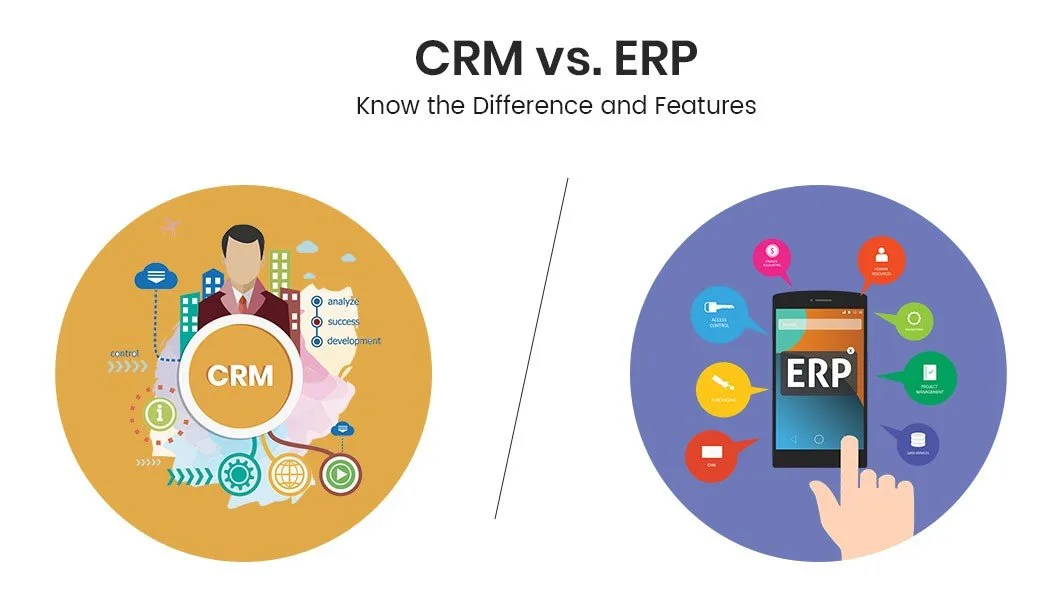ERP vs. CRM has been one of the hot topics of discussion for a decade. Organizations often have stumbled upon hard times choosing between ERP vs. CRM. They keep wondering about the difference between ERP and CRM. They are confused about choosing between a standalone CRM and ERP against an ERP-integrated CRM system.
The core functions and objectives of both apps are different. The best part is that both ERP and CRM are similar in many ways. They are both used to improve the overall efficiency, productivity, and performance of the organization. There are several benefits of ERP and CRM integration.
ERP vs. CRM has differences and similarities. Both systems are valuable and used for specific purposes. Let us dive into the details and differences between ERP and CRM.
What is an ERP?
ERP (Enterprise Resource Planning) is designed to manage business operations, improving productivity, quality, and efficiency. It has a centralized database management system to standardize and store information from multiple departments of a company. It uses advanced technologies to process such learning into actionable insights, intelligent reports, and real-time data.
An ERP primarily helps an organization streamline and automate its tasks, create custom alerts and notifications, drive actions based on the data generated, and continuously analyze data to enhance operations. The core modules of an ERP include Finance & Accounting, Procurement, Inventory & Stores, HR & Payroll, Projects, Sales, etc.
There are hundreds of ERP solutions available under a wide variety of brand names, specifications, price ranges, and sizes. Many present-day ERP systems like RealSoft, Oracle, and Dynamics have switched to cloud-based solutions by integrating ultra-modern technologies.
What is a CRM?
Businesses use CRM (Customer Relationship Management) to focus more on customer interactions, services, and customer relationships. It stores all the customer-related information in the central database for the sales and marketing team to process and act.
The CRM software organizes and redefines the sales experience by synchronizing lead management, sales, marketing, and services. It helps a team pinpoint potential leads and offer insights to nurture the relationship, win deals, and create repeat orders. A CRM software automates sales and keeps the customers happy.
It assists in building organizational strategies to retain existing clients and lock in prospective customers. It allows users to track and improve every lead, customer, proposal, campaign, and interaction to create a successful sales pipeline. CRM empowers businesses to convert every potential opportunity into sales and revenue.
Some of the processes associated with CRM software are after-sales support, lead validation, customer allocation, proposals, analysis, and ways to retain clients and new customers.
What are the primary difference between ERP and CRM?
In its simplest form, an ERP is a back-office-based system, while a CRM is a front-office-based system. Both the solutions may look similar but are fundamentally different in their approach. Despite the difference between ERP and CRM, there are several benefits of ERP and CRM integration.
The principal difference between ERP vs. CRM lies in its functions. An ERP focuses mainly on the operational side, whereas a CRM focuses on the customer side.
The core functions of CRM include;
- Contact Management
- Tracking Client Interactions
- Database Management
- Marketing
- Automated Campaigns
- Identifying New Leads
- Sales Automation
- High-quality Customer Support
- Analyzing Customer Behavior & Buying Pattern
- Customer Portal & Self-Service
- Create Sales Pipeline
- Manage Sales History, etc.
The critical functions of ERP include;
- Finance & Accounting
- HR & Payroll
- CRM
- Inventory
- Supply Chain
- Projects & Planning
- Real-time Business Data
- Tracking and Reviewing Reports
- Generating Actionable Data
- Create Business Strategies
- Centralize and Standardize Data
- Order Management
- Production
- Warehouse
- Distribution
- Eliminating Duplications
- Lowering Purchase & Overhead Costs
- Etc.
ERP systems focus on increasing profitability by improving productivity, reducing operational costs, and automating tasks. It helps the processes and operations to become more efficient.
CRM increases the profitability of a business in many ways. It helps improve customer experience, sales process, marketing campaigns, people, and resources management. It also reduces the amount spent on marketing, boosting the productivity of people and resources.
ERP and CRM integration – Can CRM be integrated with ERP?
Both CRMs and ERPs improve productivity and profitability. Therefore, ERP and CRM integration would double a company’s chance of success and sustainability. It is always better to have an integrated suite rather than standalone systems. Standalone systems will generate two sets of the same data that need to be maintained and monitored separately. An integrated suite will eliminate any possible redundancies and provide better insights.
Having improved visibility of the front-end and back-end operations alike will add more value to the system and brings several advantages. The integrated suite will be more cost-efficient than standalone systems. It promotes real-time updates of data into the database so that there is better inter-departmental collaboration and connectivity.
A unified suite of ERP and CRM provides personalized transactions and communications, driving efficiency and customer satisfaction. The sales department will get a real-time update on the project progress, inventory and stock, resource information, and other vital data to negotiate and close a sales deal dynamically and faster.
Though there are several challenges, integrating both technologies will produce a tremendous impact on a business. We now know the difference between ERP and CRM.
ERP vs. CRM – Benefits of ERP and CRM integration.
Companies often digitally transform themselves or upgrade to better business software to improve performance and visibility. ERP and CRM integration solves all the business problems, as it provides a 360-degree view of the operations, sales process, marketing campaigns, and project progress. The benefits of ERP and CRM integration include;
- Improved efficiency
- More visibility
- Eliminate duplicate data
- Boosts employee collaboration
- Faster sales process
- Smart marketing
- Automated sales
- Reduced overheads & infrastructure
- Mobility and agility
- 360-degree view
- Stable and up-to-date information
- Better customer experience and relationships
- Accurate forecasts & reports
ERP and CRM integration will seamlessly access information and increase ROI. It will provide accurate statistics on operations and customers, including the sales history, dates, patterns, pricing, etc.
RealSoft is one of the best ERP software in Dubai that is cost-efficient, intelligent, and rich with technologies. Contact us to learn more about the RealSoft ERP suite at [email protected].


